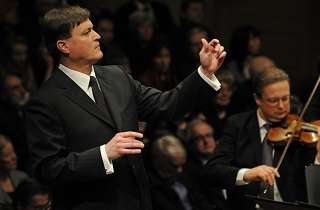|
Back
Mighty impressive Lucerne
Kultur- und Kongresszentrum Luzern
09/09/2011 -
Anton Bruckner: Symphony No. 8 WAB 108 (Haas Edition)
Sächsische Staatskapelle Dresden, Christian Thielemann (conductor)

C. Thielemann (© Matthias Creutziger)
Bruckner’s Eighth should always be an event and this performance certainly was. In the advance information for this year’s Festival Christian Thielemann apparently remarked that the audience should rediscover slowness in Bruckner’s symphonies, albeit with incredible fire within. When conducting he says he does not hear Bruckner, the devout Catholic, the “musician of God”, he does not think of St. Florian, but the starkness and Protestant clarity of the Marienkirche in Danzig. It was in Dresden in September 2009 that Thielemann stepped in at short notice, replacing an indisposed Fabio Luisi, to conduct this very symphony and only weeks later the orchestra nominated him to be their Principal Conductor as from autumn 2012. This performance was therefore a welcome opportunity to hear the result of their love affair, although I must admit I feared the effect of sluggish sloth à la Celibidache.
I need not have worried. Yes, at times the reading was slow, but never for very long and only to contrast the faster more exciting passages – and the contrasts worked well. This was a thoroughly German performance – powerful, careful precision, mighty – mighty impressive. This famous orchestra, even though not in the Berlin Philharmonic, Chicago or Concertgebouw league (yet?), are wholly immersed in Wagner and Richard Strauss, and knows the Bruckner sounds required all too well. I had forgotten that the orchestra was founded as long ago as 1548, making it one of the world’s oldest, and not realised that the young man Thielemann is now over 50.
Thielemann does not conduct flamboyantly, that is not his style. He is a Conservative and restricts his muscular arm movements to tempi and only slight gestures to encourage nuances of dynamics. He is tall and imposing, wears traditional garb (somewhat unusually these days), rarely smiles during the performance, and genuflects at the more intimate passages. The results he achieves are remarkable.
Thielemann constructed the opening movement with loving care, from the opening mystery to the closing disintegration, with a frightening apocalypse in between. The orchestra was attentive to his demands, smooth yet intensive.
Thielemann did not slow for the Scherzo but kept the tempo moving. The Trio was utterly charming. The Adagio began feierlich langsam (ceremonially slow) and at one point I did think the movement might fall apart, but soon Thielemann was master again, conjuring warm tones from the orchestra, three delightful harps and shimmering strings. The grandiose climax with cymbals crashing was perfectly executed and properly spine-tingling.
Thielemann certainly did not rush the Finale; after a powerful opening, Thielemann revelled in the movement’s rhythmic tread and steered the orchestra with virility into the final apocalypse, the incredible fire. Thielemann bowed his head for some time at the end, perhaps a short prayer to God or to Bruckner, and this had the doubtlessly desired effect of postponing the loud applause and roars of approval from the audience. Thielemann was lauded on each appearance and was visibly happy with the performance and his new orchestra. There was clear chemistry between this venerable orchestra and its Principal Conductor-in-the-waiting. Audiences in the future can expect some wonderful concerts from this pairing.
John Rhodes
|